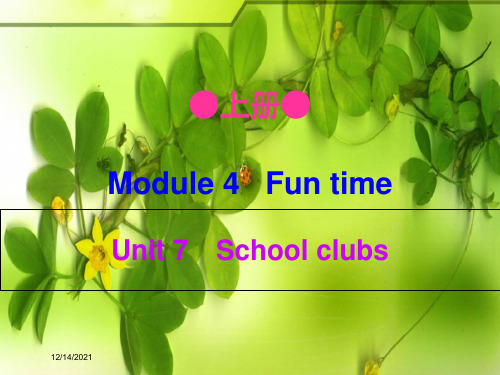七年级英语Unit7思维导图
- 格式:ppt
- 大小:516.00 KB
- 文档页数:6

七年级下册英语一到六单元作文思维导图全文共3篇示例,供读者参考篇1Title: Mind Map for Units 1-6 of Grade 7 English TextbookIntroduction:In the Grade 7 English textbook, there are six units in the second semester. These units cover various topics such as friendships, hobbies, food, transportation, and more. To better understand and remember the key points of each unit, creating a mind map can be a helpful tool.Unit 1: Friends and Friendship- Key Vocabulary: friend, friendship, loyal, trustworthy, supportive- Main Topic: qualities of a good friend- Activities: group discussions on friendship, writing a letter to a friend- Important Points: importance of honesty and trust in a friendshipUnit 2: Hobbies and Interests- Key Vocabulary: hobby, interest, passion, pastime- Main Topic: different hobbies people enjoy- Activities: creating a poster about a favorite hobby, presenting hobbies to the class- Important Points: exploring new hobbies, finding something one is passionate aboutUnit 3: Food and Eating Habits- Key Vocabulary: food, diet, nutrition, healthy, junk food- Main Topic: healthy eating habits- Activities: planning a healthy meal, discussing the benefits of a balanced diet- Important Points: importance of eating nutritious food for overall healthUnit 4: Transportation- Key Vocabulary: transportation, vehicle, commute, public transport- Main Topic: different modes of transportation- Activities: creating a presentation on eco-friendly transportation options, discussing transportation challenges in the city- Important Points: impact of transportation on the environment, importance of sustainable transportation choicesUnit 5: Environmental Issues- Key Vocabulary: environment, pollution, recycling, conservation, ecosystem- Main Topic: environmental problems and solutions- Activities: organizing a clean-up activity in the community, researching ways to reduce waste- Important Points: understanding the importance of protecting the environment for future generationsUnit 6: Celebrations and Traditions- Key Vocabulary: celebration, tradition, custom, festival, holiday- Main Topic: different cultural celebrations around the world- Activities: presenting about a traditional holiday in a chosen country, discussing the significance of rituals and traditions- Important Points: learning about and respecting diverse cultural practicesConclusion:Creating a mind map for the units 1-6 of the Grade 7 English textbook can help students organize and remember key information more effectively. By visually representing the main topics, vocabulary, and activities of each unit, students can improve their understanding of the English language and related topics. Mind mapping can be a useful study tool for students to enhance their learning experience.篇2Unit 1: Best FriendsIntroduction: Best friends are special people who play a significant role in our lives. Having a best friend is like having a sister or brother you never had. It's someone you can trust, rely on, and have fun with. In this unit, we learn about the importance of friendship and how to be a good friend.Main Points:1. Qualities of a good friend: Someone who is supportive, understanding, loyal, and trustworthy.2. Activities to do with a best friend: going shopping, watching movies, sharing secrets, etc.3. How to resolve conflicts with a friend: communication, compromise, and forgiveness.4. The importance of being a good listener and offering support when a friend is in need.Unit 2: School LifeIntroduction: School is where we spend most of our time during the week. It's essential to have a positive attitude towards school and education. In this unit, we talk about the different aspects of school life and how to excel academically.Main Points:1. Subjects we study in school: math, science, English, history, etc.2. Extracurricular activities: sports, music, drama, debate club, etc.3. Study tips: time management, taking notes, asking questions, and seeking help when needed.4. Importance of attending classes regularly and participating actively in discussions.Unit 3: My HobbiesIntroduction: Hobbies are activities we enjoy doing in our free time. They help us relax, de-stress, and express ourselves creatively. In this unit, we share our favorite hobbies and why we love them.Main Points:1. Different types of hobbies: sports, arts and crafts, reading, cooking, etc.2. Benefits of having a hobby: mental stimulation, relaxation, building skills, and making new friends.3. How to develop a new hobby: trying out different activities and finding what interests you the most.4. Sharing your hobbies with others and learning from their experiences.Unit 4: Our HomeIntroduction: Home is where we feel safe, comfortable, and loved. It's a place where we create memories with our family and friends. In this unit, we talk about the importance of home and how to create a warm and welcoming environment.Main Points:1. Different rooms in a house: living room, kitchen, bedroom, bathroom, etc.2. Activities we do at home: cooking, cleaning, watching TV, spending time with family, etc.3. Importance of having a clean and organized home: promoting harmony, reducing stress, and fostering creativity.4. How to be a responsible member of the household: helping with chores, respecting others' spaces, and communicating effectively.Unit 5: Our CommunityIntroduction: A community is a group of people living in the same area who share common interests and goals. We are all part of a community, whether it's our neighborhood, school, or city. In this unit, we learn about the importance of being an active member of our community.Main Points:1. Ways to contribute to our community: volunteering, participating in events, supporting local businesses, etc.2. Benefits of a strong community: building relationships, fostering a sense of belonging, and promoting social cohesion.3. Issues facing our community: pollution, poverty, crime, etc.4. How to address these issues: raising awareness, organizing fundraisers, and working together to find solutions.Unit 6: Protecting the EnvironmentIntroduction: The environment is essential for our health and well-being. It's our responsibility to take care of the Earth and protect it for future generations. In this unit, we talk about the importance of environmental conservation and how we can make a difference.Main Points:1. Environmental issues: global warming, deforestation, air and water pollution, etc.2. How our actions impact the environment: recycling, reducing waste, conserving energy, etc.3. Ways to protect the environment: planting trees, cleaning up litter, advocating for eco-friendly practices, etc.4. Importance of raising awareness about environmental conservation and encouraging others to take action.Conclusion: In conclusion, the topics covered in the seventh-grade English curriculum have helped us develop a better understanding of ourselves, our relationships, and the world around us. By applying the knowledge and skills we've learned, we can become more compassionate, responsible, and informed individuals. Let's continue to grow and make a positive impact on our communities and the environment.篇3Title: Mind Map for Seventh Grade English Unit 1-6Introduction:This mind map is designed to summarize and organize key information from the first six units of the seventh grade English curriculum. It includes vocabulary, grammar, reading comprehension, and writing skills covered in these units. By using this mind map as a study tool, students can easily review and reinforce their English language skills.Unit 1: Personal Information- Vocabulary: family members, personal belongings, daily routine- Grammar: present simple tense, possessive pronouns, describing people- Reading: introducing oneself, talking about hobbies and interests- Writing: writing a short paragraph about oneselfUnit 2: School Life- Vocabulary: school subjects, classroom objects, school activities- Grammar: prepositions of place, imperatives, present continuous tense- Reading: describing school routines, talking about favorite subjects- Writing: writing a letter to a pen pal about school lifeUnit 3: Friends and Relationships- Vocabulary: feelings and emotions, personality traits, friendship- Grammar: comparatives and superlatives, past simple tense, linking words- Reading: discussing qualities of a good friend, describing personal experiences- Writing: writing a dialogue between two friends about a conflictUnit 4: Health and Lifestyle- Vocabulary: healthy habits, food and drink, sports and exercise- Grammar: should and shouldn't, modals for advice and suggestions, frequency adverbs- Reading: discussing the importance of physical activity, giving healthy eating tips- Writing: writing a blog post about staying healthy and fitUnit 5: Travel and Leisure- Vocabulary: means of transportation, travel destinations, leisure activities- Grammar: future tense, past continuous tense, question forms- Reading: planning a trip, describing a recent vacation- Writing: writing a travel diary entry about a memorable tripUnit 6: Environment and Sustainability- Vocabulary: environmental issues, recycling, renewable energy sources- Grammar: passive voice, reported speech, conditional sentences- Reading: discussing ways to protect the environment, analyzing the impact of human activities- Writing: composing a persuasive essay on the importance of conservationConclusion:This mind map provides a comprehensive overview of the key concepts and skills covered in the first six units of the seventh grade English curriculum. By using this tool, students can enhance their understanding of the English language and improve their writing, reading, listening, and speaking abilities. Additionally, this mind map can serve as a valuable resource for teachers and parents to support students in their English language learning journey.。



教学·现场利用思维导图提升学生英语深层阅读能力的实践与反思———以人教版七年级英语上册Unit7“How much are these socks?”为例文|金小凤在新课标背景下,初中英语阅读教学面临诸多挑战,如学生对阅读主题的分析、关键信息的提炼等。
如何利用有限的英语课堂时间激发学生潜能,提高学生的深层阅读能力是教师要分析的重点。
而要实现这一目标,教师可以选择应用思维导图,根据初中英语阅读教学的需要,整合教育资源,为学生深层阅读能力的提升创设条件。
同时,深层阅读能力的提升不仅仅停留在语言知识点的理解上,更重要的是透过语言了解文章所隐含的人文价值、情感价值、观点思路等。
本文选择人教版英语七年级上册Unit7“How much are these socks?”这一单元展开分析,通过深层次阅读,发挥思维导图的作用,以此打造高质量的英语阅读课堂。
一、阅读前期的深化导入,促进学生对内容的理解导入这一环节是英语课堂的重要组成部分,在传统的英语阅读教学活动中,教师并没有注重导入环节的活动安排,大部分是通过简单的陈述引出新的话题。
在这种趋势下,学生的实际参与感低,还会直接影响到后期的学习状态。
因此,在阅读活动开展前,我选择了学生比较感兴趣且与生活密切关联的话题展开讨论。
教师:同学们,你们在生活中有没有买过服装?在购买不同物品时应该如何展开交流?学生1:老师,我跟我妈妈一起买过衣服。
学生2:在购买商品时要先询问价格,然后再付钱。
教师:刚才有同学提到价格,这是我在商店买的两件衣服,大家猜测一下这件短袖花了多少元?学生1:45元。
学生2:64元。
教师:这件黄色的t恤又是多少元呢?学生3:100元。
教师:不同的衣服价格都不一样,看来大家在现实生活中对于如何购买服装、衣物的价格等话题已经非常熟悉。
现在请大家以“购物”话题为主线,制作思维导图,我们现场比拼一下看谁的图例最完整,大家也可以参考教材的阅读部分。
为了帮助学生降低思维导图的制作难度,我引导学生前期先浏览阅读文本内容,然后找准每个段落中的关键信息,将零散的知识整合,然后制作思维导图,如图1所示。


七年级下册英语全册思维导图Unit 1: These are my teachers.•Vocabulary–school subjects–teachers–classroom objects–adjectives to describe people•Grammar–subject pronouns and possessive pronouns–using ‘be’ to describe people and things–using ‘have’ to show possession–asking and answering questions using ‘wh-’ words•Skills–introducing people–talking about school subjects and teachers–describing people–asking and answering questions about possessionUnit 2: This is my school.•Vocabulary–places in a school–prepositions of place–numbers 1-1000–adverbs of frequency•Grammar–using ‘there is’ and ‘there are’–using the verb ‘have’ with objects and rooms–using prepositions to describe location–forming questions with ‘where’ and giving answers•Skills–talking about your school–giving directions in a school–describing locations–asking and answering questions about places Unit 3: How do you study for a test?•Vocabulary–school activities and supplies–adverbs of manner–adjectives to describe actions–time expressions•Grammar–using present simple tense to talk about routines and habits–using adverbs of manner to describe how things are done–using adjectives to describe actions–using time expressions to talk about frequency •Skills–talking about daily routines–discussing how to study for a test–describing actions using adjectives–expressing frequency using adverbsUnit 4: I love learning English!•Vocabulary–adjectives describing feelings–types of music–activities–opinions•Grammar–using present continuous tense to talk about actions happening now–using ‘like’, ‘love’, ‘enjoy’ to talk about hobbies and activities–using adjectives to describe feelings–expressing opinions using ‘I think’, ‘I believe’•Skills–talking about hobbies and activities–expressing likes and dislikes–describing feelings–giving opinionsUnit 5: How’s the weather?•Vocabulary–weather conditions–seasons–types of clothing•Grammar–using present simple tense to talk about weather–using ‘it’ to refer to the weather–using prepositional phrases to describe weather conditions•Skills–talking about the weather–describing seasons and clothing–making predictions about the weather–giving weather forecastsUnit 6: What’s your favorite day?•Vocabulary–days of the week–activities–ordinal numbers–adjectives to describe activities•Grammar–using ‘what’ to ask about favorite things–using ordinal numbers to talk about the order of days–using adjectives to describe activities •Skills–talking about favorite activities–discussing daily routines on different days–using ordinal numbers–describing activities using adjectivesUnit 7: I want to be a basketball player.•Vocabulary–jobs–sports–school subjects related to jobs–adjectives to describe jobs•Grammar–using ‘want to’ to talk about future plans–using ‘be going to’ to talk about future intentions–using adjectives to describe jobs–using ‘because’ to give reasons•Skills–talking about future plans and intentions–discussing different jobs–describing jobs using adjectives–giving reasons using ‘because’Unit 8: Where’s the post office?•Vocabulary–places in a city–directions–prepositions of movement–adjectives to describe cities•Grammar–using ‘Can you…’ to ask for help–using imperatives to give instructions–using prepositions of movement to give directions–using ‘there is’ and ‘there are’ to talk about places in a city•Skills–asking for and giving directions–describing places in a city–using imperatives to give instructions–talking about different citiesUnit 9: How do you make a banana smoothie?•Vocabulary–food and drinks–kitchen utensils–imperatives for cooking–adjectives to describe food and taste •Grammar–using imperatives to give instructions for cooking–using ‘how much’ and ‘how many’ to ask about quantities–using adjectives to describe food and taste–using ‘like’ to express preferences•Skills–talking about cooking and food preferences–giving instructions for making a recipe–describing food and taste–asking about quantitiesUnit 10: I’m watching TV.•Vocabulary–activities–types of TV programs–time expressions–adjectives to describe TV programs •Grammar–using present continuous tense to talk about actions happening now未知驱动探索,专注成就专业–using adjectives to describe TV programs–using time expressions to talk about frequency •Skills–discussing TV programs and activities–talking about what is happening now–describing TV programs using adjectives–expressing frequency of activities11。
七年级上册英语思维导图1800字这是一个非常大的任务,我试着为你们总结出七年级上册英语的思维导图,希望对你们有帮助。
Unit 1 - My School Life主题:我的学校生活词汇:classroom, teacher, student, homework, pencil case, notebook, backpack, locker, timetable语法:be动词及其缩略式,代词,名词的单复数形式句型:What’s this/that? It’s a/an…;Is this/that a…? Yes, it is. No, it isn’t.;Who is he/she? He/She is…;What’s your name? My name is…;How do you spell it?;What class are you in? I’m in Class…Unit 2 - My Favorite Things主题:我的最爱词汇:food, drink, color, animal, sport, music, movie, book, hobby语法:系动词及其缩略式,形容词及其比较级和最高级,动词的ing形式及其用法句型:What’s your favorite…? My favorite…is/are…;What’s the color of…? It’s…;What does…like? He/She likes…;What are you doing? I’m…;What are you good at? I’m good at…;What’s your hobby? My hobby is…Unit 3 - My Weekend主题:我的周末词汇:weekend, Saturday, Sunday, morning, afternoon, evening, play, watch, go, visit, park, museum语法:现在进行时,表示时间的介词短语句型:What are you doing this weekend? I’m…;What time is it? It’s…;What do you usually do on weekends? I usually…;Are you going to…? Yes, I am. No, I’m not.;Where are you going? I’m going to…;What ishe/she doing? He/She is…Unit 4 - I Love Beijing主题:我爱北京词汇:Beijing, capital, famous, place, museum, Olympic Park, Tian’anmen Square, Great Wall, hutong语法:there be句型,表示地点的介词短语句型:Is there…in…? Yes, there is. No, there isn’t.;What can you see in…? I can see…;Where is…? It’s in…;What’s your favorite place in Beijing? My favorite place is…;What’s the weather like in Beijing? It’s…;What did you do in Beijing? I went to…Unit 5 - Seasons and Weather主题:季节和天气词汇:season, weather, temperature, sunny, cloudy, rainy, snowy, windy, hot, cold语法:主语加动词的一般疑问句句型:What’s the weather like today? It’s…;What season is it now? It’s…;What’s the temperature? It’s…degrees Celsius/Fahrenheit.;Is it…today? Yes, it is. No, it isn’t.;What do you like to do in…? I like to…Unit 6 - At the Zoo主题:在动物园词汇:zoo, animal, panda, elephant, giraffe, lion, tiger, monkey, bird, reptile, fish语法:名词所有格,数量词及其用法句型:What’s your favorite animal? My favorite animal is…;What’s this/that animal? It’s a/an…;Can you see…? Yes, I can. No, I can’t.;How many…are there? There are…;What does the…eat? It eats…Unit 7 - My Family主题:我的家庭词汇:family, father, mother, sister, brother, cousin, grandparent, aunt, uncle, pet, family tree语法:人称代词,物主代词,名词所有格句型:What’s your family like? My family is…;Who is he/she? He/She is my…;Do you have any pets at home? Yes, I do. No, I don’t.;What’s his/her name? His/Her name is…;Whose…is this/that? It’s…’s.;How old is…? He/She is…Unit 8 - I Want to Be a Detective主题:我想成为侦探词汇:detective, mystery, clue, suspect, witness, crime scene, camera, notebook, magnifying glass语法:情态动词can的用法,现在完成时句型:What does a detective do? A detective…;Can you…? Yes, I can./No, I can’t.;Have you ever…? Yes, I have./No, I haven’t.;What did you do yesterday? I…;Who do you think did it? I think…did it.;What do you need to be a detective? You need…。
英语学习:人教版七年级下册各单元思维导图Unit 1: My School Life- Vocabulary:- Classroom objects- School subjects- Grammar:- Simple present tense- Plural forms of nouns- Speaking:- Talking about school facilities- Describing school subjects and preferences- Listening:- Understanding class schedules- Following instructions in the classroomUnit 2: Hobbies- Vocabulary:- Leisure activities- Sports and games- Grammar:- Present continuous tense- Adverbs of frequency- Speaking:- Talking about hobbies and interests- Discussing preferences and dislikes- Listening:- Understanding conversations about hobbies- Following instructions for games and activitiesUnit 3: At Home- Vocabulary:- Rooms and furniture- Daily routines- Grammar:- Present simple tense- Prepositions of place- Speaking:- Describing rooms and houses- Talking about daily routines- Listening:- Understanding conversations about household chores - Following instructions for recipes and tasksUnit 4: Food and Drink- Vocabulary:- Types of food and drinks- Quantifiers- Grammar:- Countable and uncountable nouns- How much/How many- Speaking:- Talking about food preferences- Ordering food at a restaurant- Listening:- Understanding conversations about meals and recipes - Following instructions for cooking and servingUnit 5: Family and Friends- Vocabulary:- Family members- Personal pronouns- Grammar:- Possessive adjectives- Wh-questions- Speaking:- Introducing family members- Describing relationships- Listening:- Understanding conversations about family activities- Following instructions for interviews and introductionsUnit 6: At the Zoo- Vocabulary:- Animals and their characteristics- Adjectives to describe animals- Grammar:- There is/are- Speaking:- Talking about animals and their habitats- Listening:- Understanding conversations about zoo visits - Following directions for finding animalsUnit 7: The Weather- Vocabulary:- Weather conditions- Seasons and months- Grammar:- Present continuous for future arrangements - Adjectives to describe weather- Speaking:- Talking about weather in different seasons - Making plans based on weather forecasts- Listening:- Understanding weather reports- Following instructions for outdoor activitiesUnit 8: Holidays- Vocabulary:- Festivals and celebrations- Holiday activities- Grammar:- Past simple tense- Time expressions- Speaking:- Talking about past holidays and celebrations- Describing holiday traditions- Listening:- Understanding conversations about holiday experiences - Following instructions for crafts and gamesUnit 9: Around Town- Vocabulary:- Places in a city- Directions and locations- Grammar:- Imperatives- Giving and following directions- Speaking:- Asking for and giving directions- Describing places in a city- Listening:- Understanding conversations about city attractions - Following directions to different locationsUnit 10: Health and Fitness- Vocabulary:- Body parts and health issues- Sports and exercises- Grammar:- Present continuous for future arrangements- Imperatives for instructions- Speaking:- Talking about health and fitness routines- Giving advice on healthy habits- Listening:- Understanding conversations about health problems - Following instructions for exercises and workouts。
Unit 7 How much are these socks?一、思维导图重点单词:sock,shoe,T-shirt,shorts,sweater,trousers,skirtbig,small,short,longten,eleven,twelve,thirteen,fifteen,eighteen,twenty,thirtymuch,dollar,woman,need,look,pair,take,Mr.,clothes,store,buy,sale,sell,all,very,price,boy重点短语:how much, on sale, a pair of, great sale, at good prices核心句型:1.---How much is the hat?---It’s five dollars.2.---How much are those black trousers?---They’re nine dollars.3.---Can I help you?---Yes, please.I need a sweater for school.4.I’ll take two pairs.5.We sell all our clothes at very good prices.6.For girls, we have skirts in purple for only 20 dollars.重点语法:1.how much的用法2.基数词的构成及用法交际话题:购物询问价格,谈论衣物,提供帮助,感谢他人文化知识:1.了解货币单位“人民币”和“美元”2.了解一些购物礼仪二、重点难点基数词的构成基数词表示数目的多少,而序数词表示顺序的先后。
现就本单元和前面所学的基数词归纳如下:(1)从1--10这几个数词,形式如下:one,two,three,four,five,six,seven,eight,nine, ten。
Unit 7 Happy Birthday! (写作提升)描写如何庆祝自己的生日【典例导引】本单元写作主要是围绕“生日”来进行讨论的,比如表达自己以及周围人的生日,具体描述生日的日期以及行程安排。
命题人通常会把这一话题作文设置为提示性命题作文,文体通常为记叙文,人称多用第一人称,时态一般以一般现在时为主,行文中需要确切表达生日的日期以及具体的庆祝活动。
本单元相关话题写作素材有:(1)My birthday is on...我的生日在······(2)Long noodles are a symbol of long life.长面条是长寿的象征。
(3)I like...because...我喜欢······因为······(4)I usually have a party with my friends to celebrate.我通常和我的朋友们举办聚会来庆祝。
(5)This year,I want to...今年,我想要······(6)I think it's a good idea to ... on your birthday.我认为在你生日那天······是个好主意。
(7)Everyone sings... and then I...and...每个人都唱······然后我······和······【典例】近日,某英文论坛开设了“生日专栏”。